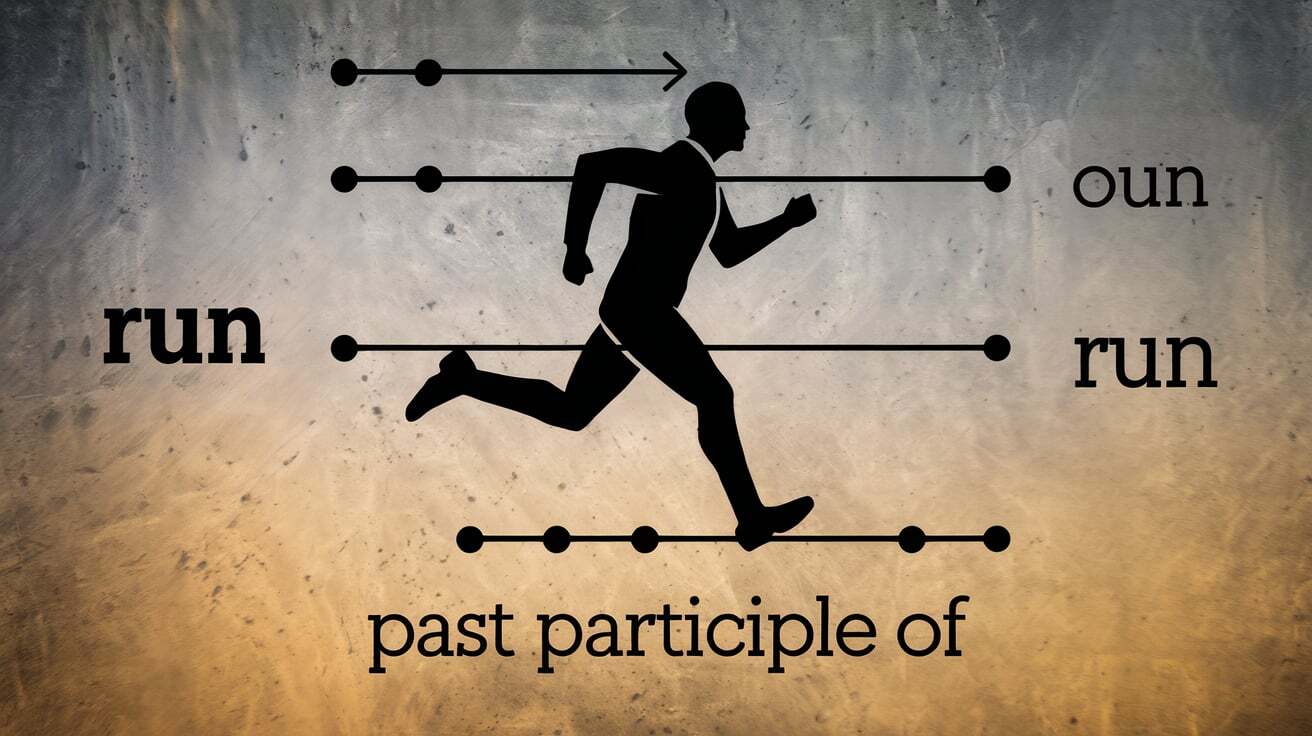Mastering the Verb “Run”: A Comprehensive Guide to Past Tense and Past Participle
In the ever-evolving landscape of English grammar, few verbs are as versatile and commonly used as “run.” Yet, this seemingly simple word can trip up even seasoned speakers and writers when it comes to its past tense and past participle forms. This guide will take you on a journey through the various forms of “run,” helping you master its usage in different contexts and tenses.
The Present Tense of “Run”
Before we dive into the past tense and past participle forms, let’s quickly revisit the present tense of “run.” In its simplest form, “run” means to move swiftly on foot. However, it’s a verb with numerous meanings and applications:
- She runs a successful business.
- The river runs through the valley.
- My computer runs on the latest operating system.
These examples showcase the versatility of “run” in its present tense form. Now, let’s explore how this changes in the past tense and past participle.
The Past Tense of “Run”
The past tense of run is “ran.” This irregular verb form often catches people off guard, as it doesn’t follow the typical “-ed” ending rule. Here are some examples to illustrate its usage:
- I ran a marathon last year.
- She ran for office in the local elections.
- The experiment ran for three hours before yielding results.
It’s crucial to remember that “runned” is never correct. This is a common mistake made by non-native speakers and children learning English.
“I ran to catch the bus, but it had already left.” – A classic example of using “run” in past tense.
The Past Participle of “Run”
The past participle of run is “run.” Yes, it’s the same as the present tense form, which can sometimes lead to confusion. The past participle is used with auxiliary verbs like “have,” “has,” and “had” to form perfect tenses. For example:
- I have run this route many times.
- She had run out of ideas by the end of the meeting.
- The printer has run out of ink again.
Understanding the difference between the past tense and past participle is crucial for mastering English verb forms. Let’s compare them:
| Form | Example |
|---|---|
| Past Tense | I ran to the store. |
| Past Participle | I have run to the store many times. |
“Run” in Progressive Tenses
To fully grasp the verb “run,” we must also explore its usage in progressive tenses. These forms emphasize ongoing actions:
- Present Progressive: I am running late for the meeting.
- Past Progressive: They were running tests when the power went out.
- Present Perfect Progressive: We have been running this campaign for months.
- Past Perfect Progressive: By noon, she had been running for three hours straight.
These progressive forms add depth and nuance to your writing and speech, allowing you to convey ongoing actions precisely.
Compound Forms of “Run”
“Run” often appears in phrasal verbs, which can change its meaning significantly. Here are some common examples:
- Run out: “We’ve run out of milk.”
- Run into: “I ran into an old friend at the grocery store.”
- Run over: “Be careful not to run over that pothole.”
When using these compound forms, the tense rules still apply. For instance:
- Past tense: She ran out of patience.
- Past participle: The project has run over budget.
“Run” in Passive Voice
While less common, “run” can be used in passive voice constructions:
- Active: They ran the tests yesterday.
- Passive: The tests were run yesterday.
Remember, in passive voice, the subject receives the action rather than performing it.
Common Expressions and Idioms with “Run”
English is rich with idiomatic expressions using “run.” Here are a few to add color to your language:
- “Run for office” – To campaign for an elected position
- “Run into trouble” – To encounter problems
- “Run out of time” – To have no time left
- “Run in the family” – A trait or condition that’s common in a family
“Success doesn’t run in our family. It gallops!” – Anonymous
These expressions often maintain their form regardless of tense:
- He ran for office last year. (Past tense)
- They have run into trouble with the new software. (Present perfect)
“Run” in Different English Dialects
While the core usage of “run” remains consistent across English-speaking countries, some dialectal differences exist:
- In British English, you might hear “run” used more frequently in place of “go” in certain contexts: “I’m running to the shops.”
- American English tends to use “run” more literally related to movement: “I’m running to catch the bus.”
Tips for Mastering “Run” in All Its Forms
- Practice makes perfect: Create sentences using “run” in different tenses and contexts.
- Read widely: Exposure to various texts will help you internalize correct usage.
- Use mnemonic devices: For example, “I ran in the past, but I have run in the present perfect.”
Quick Reference Table
| Tense | Form of “Run” | Example |
|---|---|---|
| Present | run | I run daily. |
| Past | ran | I ran yesterday. |
| Past Participle | run | I have run many marathons. |
| Present Progressive | running | I am running now. |
| Past Progressive | was/were running | I was running when it started to rain. |
Conclusion
Mastering the verb “run” in its various forms is a significant step towards improving your English language skills. From its irregular past tense “ran” to its identical present and past participle form “run,” this verb presents unique challenges and opportunities for expression.
Remember, language is a living thing, constantly evolving. While the rules we’ve discussed here are current, always be open to learning new usages and expressions. Keep practicing, stay curious, and soon you’ll be running circles around others in your command of this versatile verb!
FAQ Section
Q: Is “runned” ever correct?
A: No, “runned” is never correct. The past tense of “run” is always “ran.”
Q: How does “run” differ from similar verbs like “sprint” or “jog”?
A: While all involve moving on foot, “run” is a general term for swift movement. “Sprint” implies a short burst of very fast running, while “jog” suggests a slower, steady pace.
Q: Can “run” be used as a noun, and does it change?
A: Yes, “run” can be a noun (e.g., “I’m going for a run”). As a noun, it doesn’t change form for plural (e.g., “I’ve been on many runs”).
Q: Are there any exceptions to the rules for “run”?
A: While the basic rules are consistent, some idiomatic expressions might seem to break these rules. Always consult a reliable dictionary if you’re unsure about a specific usage.







